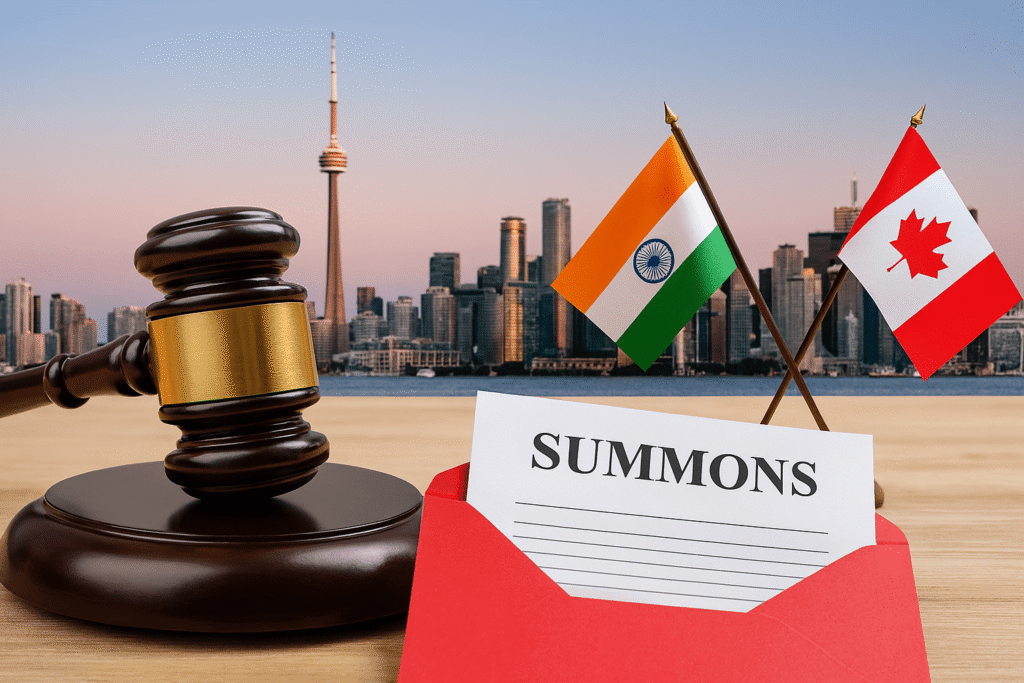Receiving a legal notice or summons from India while residing in Canada can be daunting. However, understanding the legal procedures and your rights can help you navigate this situation effectively. This comprehensive guide outlines the steps to take, legal frameworks involved, and practical tips to respond appropriately to legal communications from India.
Understanding Legal Notices and Summons
Legal Notice:
A legal notice is a formal communication sent by one party to another, informing them of a legal obligation or impending legal action. In India, legal notices are commonly used in civil disputes, such as property issues, contract breaches, or financial matters.
Summons:
A summons is an official document issued by a court, directing an individual to appear before it. Summonses can be issued in both civil and criminal cases and are a crucial part of the judicial process.
Legal Framework Governing Service of Summons and Notices
1. Civil Procedure Code (CPC), 1908
-
Order V, Rule 20: Allows Indian courts to issue summons to defendants residing outside India, including Canada.
-
Order V, Rule 26: Permits service through Indian diplomatic missions or consulates abroad.
2. Criminal Procedure Code (CrPC), 1973
-
Section 105: Empowers the Indian government to enter into reciprocal arrangements with foreign countries for the service of summons and warrants.
-
Section 105A: Allows for the service of summons through Indian embassies or consulates.
3. Hague Service Convention (1965)
-
Both India and Canada are signatories to this convention, which provides a standardized method for serving legal documents between countries.
-
The Ministry of Law and Justice, India, acts as the Central Authority for receiving and executing requests for service under the convention.
Steps to Respond to a Legal Notice or Summons from India
1. Acknowledge Receipt Promptly
Upon receiving a legal notice or summons, acknowledge its receipt to the sender or the relevant authority. This demonstrates your awareness of the communication and your intent to address the matter.
2. Understand the Contents Thoroughly
Carefully read the notice or summons to comprehend the allegations, claims, or orders. Identify key details such as the nature of the dispute, the relief sought, and any deadlines mentioned.
3. Consult a Legal Professional
Engage a qualified legal professional experienced in Indian law to guide you through the process. They can provide advice on the validity of the claims, potential defenses, and the best course of action.
4. Prepare a Detailed Response
Based on legal advice, prepare a comprehensive response addressing each point raised in the notice or summons. Your response should:
-
Deny or admit allegations as appropriate.
-
Provide evidence supporting your position.
-
Cite relevant legal provisions or precedents.
-
Suggest possible resolutions or counterclaims.
5. Submit the Response Within the Stipulated Timeframe
Ensure that your response is submitted within the timeframe specified in the notice or summons. Delays can adversely affect your case and may lead to legal consequences.
6. Maintain Copies of All Communications
Keep copies of all correspondence, including the original notice or summons, your response, and any acknowledgments of receipt. These documents may be crucial if the matter escalates to legal proceedings.
Methods of Service of Summons from India to Canada
1. Through the Central Authority under the Hague Service Convention
-
The Indian court forwards the summons to the Ministry of Law and Justice, India.
-
The Ministry transmits the summons to the appropriate authority in Canada for service.
-
Upon successful service, a certificate of service is issued and sent back to India.
2. Through Indian Diplomatic Missions
-
The Indian court may send the summons to the Indian embassy or consulate in Canada.
-
The mission serves the summons to the recipient in accordance with local laws.
-
Proof of service is provided to the Indian court.
3. Direct Service by Registered Post or Courier
-
In some cases, the court may permit direct service through registered post or courier.
-
The recipient must acknowledge receipt, and proof of delivery is submitted to the court.
Challenges in Responding to Legal Notices and Summons from Abroad
-
Jurisdictional Issues: Determining the appropriate court and legal jurisdiction can be complex when parties are in different countries.
-
Language Barriers: Legal documents may be in languages unfamiliar to the recipient, complicating understanding and response.
-
Time Constraints: Strict deadlines for responses can be challenging due to time zone differences and international postal delays.
-
Cultural Differences: Understanding and navigating legal procedures may be difficult due to differing legal systems and practices.
Frequently Asked Questions (FAQs)
Q1: Is it mandatory to respond to a legal notice or summons from India?
Yes, failing to respond can result in adverse legal consequences, including the possibility of an ex parte judgment.
Q2: Can I respond to a legal notice or summons without a lawyer?
While it’s possible, it’s advisable to consult with a legal professional to ensure your response is legally sound and protects your interests.
Q3: How can I verify the authenticity of a legal notice or summons received from India?
Contact the issuing court or authority directly using official contact information to verify the authenticity of the document.
Q4: What should I do if I cannot meet the deadline for responding?
Inform the issuing authority or court promptly and seek an extension if justified. Legal advice can help in such situations.
Q5: Can I be compelled to appear in an Indian court while residing in Canada?
In certain cases, courts may permit representation through a power of attorney or legal representative, but personal appearance may be required in some instances.
Responding to legal notices and summons from India while residing in Canada requires a clear understanding of the applicable legal frameworks and procedures. By promptly acknowledging receipt, consulting with legal professionals, and preparing a detailed response, you can effectively address the matter and protect your legal rights. Always ensure compliance with relevant laws and timelines to navigate the process smoothly.




